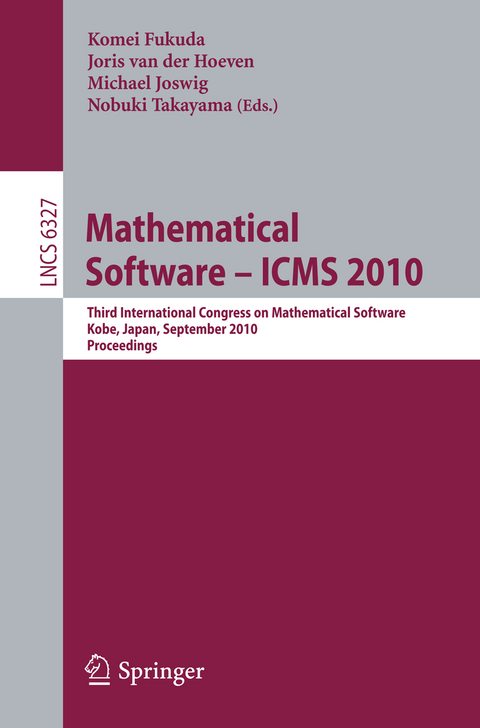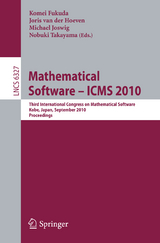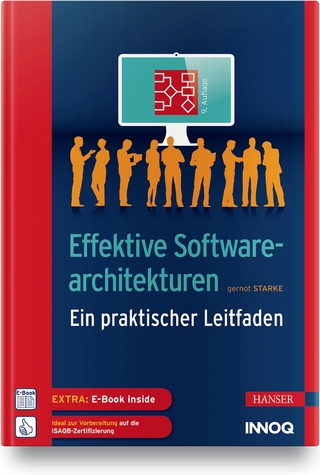Mathematical Software - ICMS 2010
Springer Berlin (Verlag)
978-3-642-15581-9 (ISBN)
Plenary.- Computational Discrete Geometry.- Exploiting Structured Sparsity in Large Scale Semidefinite Programming Problems.- Reliable and Efficient Geometric Computing.- The Sage Project: Unifying Free Mathematical Software to Create a Viable Alternative to Magma, Maple, Mathematica and MATLAB.- Computation of Special Functions (Invited).- Sollya: An Environment for the Development of Numerical Codes.- Validated Special Functions Software.- The Dynamic Dictionary of Mathematical Functions (DDMF).- Reliable Computing with GNU MPFR.- Computational Group Theory (Invited).- Simplicial Cohomology of Smooth Orbifolds in GAP.- Computing Polycyclic Quotients of Finitely (L-)Presented Groups via Groebner Bases.- Constructive Membership Testing in Black-Box Classical Groups.- Computational Group Theory (Contributed).- Towards High-Performance Computational Algebra with GAP.- An Improvement of a Function Computing Normalizers for Permutation Groups.- A GAP Package for Computation with Coherent Configurations.- Computer Algebra (Invited).- CoCoALib: A C++ Library for Computations in Commutative Algebra... and Beyond.- LinBox Founding Scope Allocation, Parallel Building Blocks, and Separate Compilation.- FGb: A Library for Computing Gröbner Bases.- Fast Library for Number Theory: An Introduction.- Exact Numeric Computation for Algebraic and Geometric Computation (Invited).- Controlled Perturbation for Certified Geometric Computing with Fixed-Precision Arithmetic.- Exact Geometric and Algebraic Computations in CGAL.- On Solving Systems of Bivariate Polynomials.- Accurate and Reliable Computing in Floating-Point Arithmetic.- Exact Numeric Computation for Algebraic and Geometric Computation (Contributed).- Deferring Dag Construction by Storing Sums of Floats Speeds-Up Exact Decision Computations Based on Expression Dags.- The Design of Core 2: A Library for Exact Numeric Computation in Geometry and Algebra.- Formal Proof (Invited).- Introducing HOL Zero.- Euler's Polyhedron Formula in mizar.- Building a Library of Mechanized Mathematical Proofs: Why Do It? and What Is It Like to Do?.- Linear Programs for the Kepler Conjecture.- A Formal Proof of Pick's Theorem.- Formal Proof (Contributed).- Evaluation of Automated Theorem Proving on the Mizar Mathematical Library.- Geometry and Visualization (Invited).- On Local Deformations of Planar Quad-Meshes.- Construction of Harmonic Surfaces with Prescribed Geometry.- Geometry and Visualization (Contributed).- A Library of OpenGL-Based Mathematical Image Filters.- MD-jeep: An Implementation of a Branch and Prune Algorithm for Distance Geometry Problems.- TADD: A Computational Framework for Data Analysis Using Discrete Morse Theory.- Groebner Bases and Applications (Invited).- to Normaliz 2.5.- Computer Algebra Methods in Tropical Geometry.- Groebner Bases and Applications (Contributed).- A New Desingularization Algorithm for Binomial Varieties in Arbitrary Characteristic.- An Algorithm of Computing Inhomogeneous Differential Equations for Definite Integrals.- New Algorithms for Computing Primary Decomposition of Polynomial Ideals.- An Automated Confluence Proof for an Infinite Rewrite System Parametrized over an Integro-Differential Algebra.- Operadic Gröbner Bases: An Implementation.- Number Theoretical Software (Invited).- Magma - A Tool for Number Theory.- Number Theoretical Software (Contributed).- Enumerating Galois Representations in Sage.- NZMATH 1.0.- Software for Optimization and Polyhedral Computation (Invited).- Removing Redundant Quadratic Constraints.- Traversing Symmetric Polyhedral Fans.- C++ Tools for Exploiting Polyhedral Symmetries.- isl: An Integer Set Library for the Polyhedral Model.- Software for Optimization and Polyhedral Computation (Contributed).- The Reformulation-Optimization Software Engine.- Generating Smooth Lattice Polytopes.- Reliable Computation (Invited).- Mathemagix: Towards Large Scale Programming for Symbolic and Certified Numeric Computations.- Complex InclusionFunctions in the CoStLy C++ Class Library.- Standardized Interval Arithmetic and Interval Arithmetic Used in Libraries.- Reliable Computation (Contributed).- Efficient Evaluation of Large Polynomials.- Communicating Functional Expressions from Mathematica to C-XSC.
| Erscheint lt. Verlag | 30.8.2010 |
|---|---|
| Reihe/Serie | Lecture Notes in Computer Science | Theoretical Computer Science and General Issues |
| Zusatzinfo | XIV, 368 p. 59 illus. |
| Verlagsort | Berlin |
| Sprache | englisch |
| Gewicht | 577 g |
| Themenwelt | Mathematik / Informatik ► Informatik |
| Mathematik / Informatik ► Mathematik | |
| Schlagworte | Algorithm analysis and problem complexity • algorithms • Calculus • computational mathematics • Computational Number Theory • Computer Algebra Packages • C++ programming language • Design • Geometric Computing • Geometry • High Performance Computing • LA • mathematical visualization • Mathematik • Number Theory • Permutation • programming • Scientific Computing • Software • Symbolic Computation |
| ISBN-10 | 3-642-15581-2 / 3642155812 |
| ISBN-13 | 978-3-642-15581-9 / 9783642155819 |
| Zustand | Neuware |
| Haben Sie eine Frage zum Produkt? |
aus dem Bereich




